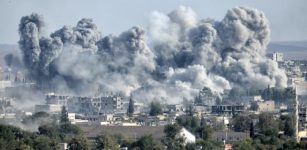The Hypocrisy Surrounding US Airstrikes in Syria

The US military airstrike targeting the government-controlled Shayrat airbase in Syria last Thursday night has raised questions as to motivations of US president Donald Trump ordering the attack. The president did not seek congressional approval for the strike, which comprised 59 Tomahawk missiles.
Raytheon is the company that produces the long-range subsonic missiles. In the wake of the attack, the company’s stock surged, along with those of four other missile and weapon manufacturing companies. Last month, Trump did promise an “historic” increase in military spending.
The strike came in response to a chemical attack on civilians that killed 86 people, including at least 30 children in the town of Khan Sheikhun, in the rebel-held area of Idib, last Monday. The US blamed the regime of Syrian president Bashar al-Assad for the attack. However, the government has denied responsibility.
The president has a heart?
From his Mar-a-Lago estate in Florida, Trump announced his intention to launch “a targeted military strike on the airfield in Syria from where the chemical attack was launched.”
“Assad choked out the lives of helpless men, women and children,” the president said as he addressed the nation. “Even beautiful babies were cruelly murdered in this very barbaric attack. No child of God should ever suffer such horror.”
And this is where the hypocrisy begins to reveal itself. Those Syrian babies whose horrendous deaths so moved the president to take action, are the same Syrian babies that Trump has been trying to ban from entering the US and hence escape such atrocities.
Banning those you’re trying to save
Trump signed off on his on-again off-again Muslim ban on January 27. It originally called for a temporary halt on citizens from seven majority-Muslim nations, including Syria, entering the US. It also intended a three month ban on refugees entering the country.
But for Syrian refugees, the ban was to be indefinite.
US courts blocked the ban. Trump reissued an amended order in March, which was subsequently placed under a preliminary injunction by a Hawaiian federal court judge.
The US president also made a campaign promise to send all Syrian refugees that are already in the United States back to Syria if he was elected. But now, we’re meant to believe Trump has suddenly had a change of heart.
US perpetrated civilian deaths
Since Trump entered office, nearly 1,000 civilians in Syria and Iraq have been killed by US airstrikes.
This includes up to 200 civilians killed in one airstrike in Mosul and around forty civilians in a bombing of a mosque in al-Jena – close to the scene of the chemical strike – last month.
These deaths suggest that the Trump administration has little concern for the lives of Syrian civilians.
Australia’s reaction
Meanwhile back in Australia, there seems to be some home-grown hypocrisy over the incident.
Prime minister Malcolm Turnbull issued his second endorsement of the US airstrike on Saturday. He said the day prior that Australia was in discussions with its allies about the next steps to be taken.
However, the Australian government that is supporting the US military intervention against the Assad regime, is the same government that has enacted a law that criminalises its own citizens from traveling to Syria to fight against Assad.
In 2014, the Coalition government passed the Counter‑Terrorism Legislation Amendment (Foreign Fighters) Act. It provides that if an individual travels to certain areas – such as parts of Syria or Iraq – they have to prove they weren’t involved in terrorist activity whilst there, or else face a lengthy prison sentence.
The offence shifts to onus of proof from the prosecution to the defendant, thereby undermining the presumption of innocence.
Chemical weapons
The effects of chemical weapons are horrific. Their use was banned under the Geneva Convention of 1925. The possession of such weapons has been illegal since 1993, when the Chemical Weapons Convention was established. Syria belatedly ratified the convention in 2013.
The Assad regime has used these weapons in the past. For example in August 2013, a gas attack was carried out on the town of Ghouta in Syria. President Obama considered airstrikes, but ultimately decided against carry them out, after the congressional authorisation he sought wasn’t forthcoming.
At that time, Trump argued heatedly against US military intervention. On September 7 that year, he tweeted, “President Obama, do not attack Syria. There is no upside and tremendous downside.”
Obama then made arrangements with Russia to move Syria’s chemical weapons out of the country, and had them destroyed.
False flag rumours
There is also great contention over who was actually behind the latest chemical attack. While the US are pointing the finger at Assad, Russian president Vladimir Putin denied it had anything to do with the regime and said his nation would continue to back the Syrian president.
Some commentators, such as former Texas Congressman Ron Paul, suggest there was no reason for the Assad regime to have carried out the attack at this time, as peace talks were set to take place, and rebel factions were starting to lose ground.
Mr Paul believes it could have been a “false flag” operation, which is when a party carries out an attack to make it seem like a different party was the perpetrator.
The political commentator stated that the attack could have been carried out by rebel forces in order to draw the Trump administration into the conflict.
US involvement in Syria
Robert F Kennedy Jnr, nephew of former US president John F Kennedy, wrote in Politico that the US has been covertly involved in Syrian political affairs since the 1950s. And attempts by the CIA to overthrow Syrian governments, led the nation to form an allegiance with Russia.
In his view, the conflict in Syria goes back much further than six years. Kennedy points to the Qatar pipeline that was first proposed in 2000. The pipeline was going to run from Qatar to Turkey, via Syria, and provide natural gas to Europe.
Currently, Russia supplies the EU with 30 percent of its natural gas, and the proposed pipeline would have threatened its hold on the market. In 2009, Assad refused to sign an agreement to allow the pipeline to run through his country, ensuring that its closest ally maintained its position.
And it’s not just Syria
Trump rose to power with isolationist sentiments. He claimed that under his presidency, the United States would no longer be so prone to engaging in international conflicts.
But now we’re supposed to believe that one attack on civilians has caused him to change his mind, less than three months into office.
And it seems that Syria is not the only country the new administration has its eyes on. Over the weekend, the US ordered a navy strike group to move towards the Korean peninsula, over concerns about North Korea’s missile program.
Trump has warned that the US is prepared to act alone to deal with the nuclear threat that he believes North Korea poses.








